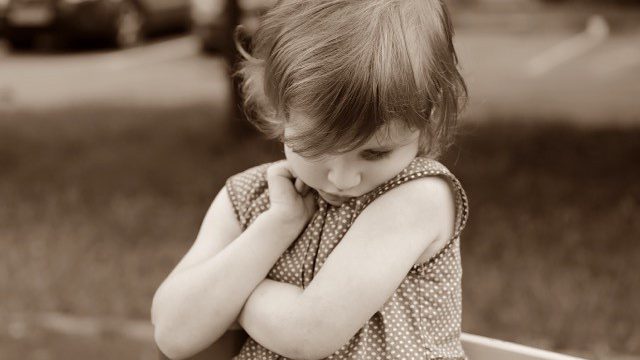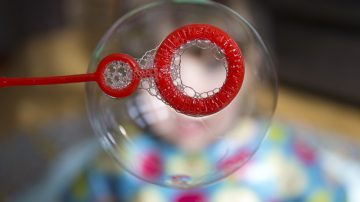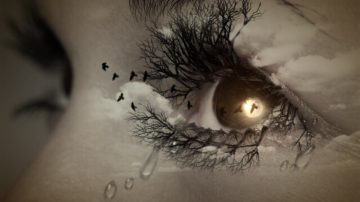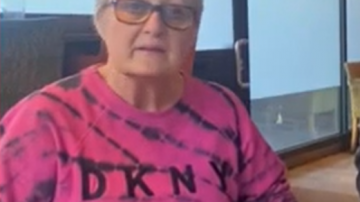Once upon a time, not so very long ago, there was a little girl who had big worries and sticky thoughts.
The sticky thoughts were always dark.
They would not leave her head, and would intrude on her daily life, particularly at bedtimes.
She was born, as some people are, having already learned the lesson of fear. She knew from an early age, from the abstract rather than from experience, about death, and germs, and contamination and loss. And other largely nameless, shapeless but no less real, bad things.
She knew them instinctively, inherently, like a newborn lamb knows a wolf.
Even distracted, even laughing, she would know deep down there was dark waiting, that light was the illusion. That she would pay for happiness in an eternal trade off.
And so, she learned to dread.
And after she learned to dread, she learned to bargain.
Because the little girl knew that the only way to stop the dark was to control it, feed it, and pander to its needs. She knew with the same deep-down, guttural certainty that it was her job to protect everyone. To stop the bad things from coming.
So, she developed routines that would keep her safe, and keep her family safe. And if she did them, it would all be OK. That was the deal she made.
The burden of this responsibility was large, for the little girl was only little. But if she tried to cheat, the dark’s insistent voice would drill in her head until her vision blurred, her throat closed and her heart pounded. There was little choice for the little girl but to obey.
So, she did. She checked the light switches 316 times, 16 for luck, being 4 x 4, her lucky number. Because if they got stuck in that excruciating, flickering, juddering centre, the Dark would come.
She learned to doubt. To doubt she had checked enough, was sure enough, had given enough to the dark.
After the light switches, she checked the taps. She checked the taps were off 32 times each, until she broke the washers and they had to be replaced. Her Dad shouted, but his noise was not as scary as the Dark.
The little girl’s Mum and Dad used to joke about her 32 trips up and down the landing at bedtime. Until she learned to wait until they were downstairs, or asleep, until she had memorised all the squeaky floorboards and how to avoid them.
They did not know how hard she tried not to go down the landing again. How many times she assured herself the taps were off. How terrible and frightening the dark was in her head telling her she hadn’t done it right, that she wasn’t sure, that she needed to check again.
They did not know how many times the routine was interrupted, and the little girl would sob as she had to start all over again.
They did not know the exhaustion, the yawning hopelessness when she was forced to creep out of her bedroom once more, already knowing deep down it wasn’t yet the last time. Knowing the she wasn’t broken enough yet, or tired enough yet.
The little girl learned to grit her teeth and endure, and go through the gruelling routines until they could finally be finished. Until she was finally allowed to go to sleep.
Sometimes the little girl was up so late with her checking, her creeping, her protecting, she could barely open her eyes in the morning. But she did, because she had a whole day to live and forget until the dark called again.
And so often she seemed happy. Because relief and freedom, however brief, are powerful too. And so, she learned to be high as well as to be low, and this became a pattern.
Although the dark wanted to be secret, they did know some things, the Mum and Dad. They knew, for instance, about the handwashing, because the little girl was chapped, and sore, and often bleeding. But this was cleaner, always, than the alternative. They scolded, and threatened, and moisturised. But the little girl knew she could not stop, and she knew she could not explain to them why.
And so gradually the little girl learned solitude, and shame, and loneliness.
The Mum and Dad also knew about the gas, and the locks. They knew she would beg them to check the gas hobs and that the front and back doors were locked before they came to bed.
They did not know that she would wait for them to come and check on her before she could go to sleep, so she’d be able to ask if they’d done it. Doubt, of course, never let her believe their assurances.
They knew, too, that the little girl had seen the dark enter one of her toys, and could not sleep knowing it was there, alive, watching out of orange, staring glass eyes. They knew only because it got so bad, trying to live with it, that the little girl burst one day and had to ask for their help.
But they did not know how much that failure cost her with the dark. For telling its secrets. They did not know how much she loved that toy, or the guilt of giving it up because she was too weak to cope and control and protect. They didn’t know the relief their little girl felt going on holiday, to be able to leave her responsibilities behind. To not have to worry about the stupid stuffed cat, now relegated to the back of her Dad’s wardrobe. And they didn’t know when she realised the dark had followed them, and that she would not really be free, or safe, anywhere.
They did not know that the dark had finally taught the little girl despair.
Eventually, though, the Mum and Dad knew enough about the obsessive thoughts, and rituals, and worries, to do something about them.
And so, the Little girl went to big hospital, and she endured the kind eyes, and kind silences, meant for her to fill. She endured the hateful two-way mirror, and dirty communal toys, and talking about feelings, and seeing the real mad people holding their heads and swaying in the corridors.
Eventually she let enough out, and let enough in, for things to improve.
And they did improve things for the little girl.
Lots of things helped as she grew. Friends helped, and hobbies, and pets. And then after that alcohol, and drugs, and desire.
The dark receded.
But it did not leave.
So, the little girl grew into a big girl, who hated sleepovers and school trips, and picked her skin.
The big girl became a teenager who was late to school every day because she was picking her skin, covering her spots, and returning to check the door was locked 16 times, only making down the hill when the imprint of the handle was bruised into her palm. And the dark still whispered the door wasn’t locked. It whispered that she was ugly, that she would always fail, that she would never be enough, that people would see through her, that she was broken.
In time, the teenager became a young woman who controlled her environment and structured her life in such a way that she could be comfortable, and give just enough to the dark. Just enough to get by.
The young woman avoided risk, and uncertainty, and spontaneity. She knew she had to stay even and steady. So, she stayed blind to the things that would upset the balance she had engineered. She embraced ordinary. And gradually the impression of normal became so good she forgot that it wasn’t real.
Yes, the young woman checked the gas and the door locks, avoided her post, and sometimes forgot how to breathe out. But mostly, mostly she dared to think she was fixed.
And then, then the young woman became a mother.
And she realised at that very moment those lessons she had learned, those patterns, were still there, well-worn, well-used grooves in her mind.
And the dark was ready and waiting, and surged down them like boiling, bubbling lava.
Although she knew it’s tricks, she was powerless to resist them because her responsibilities: protecting the tiny life of her new daughter, keeping her safe, bringing her up to be better than herself, were bigger than ever. And so, the big worries were bigger than ever, and the sticky thoughts were stickier than ever, and the bad things were worse than ever.
The fear was back, of germs, of contamination, of sickness, of death, of loss, of having it all snatched away from her. So, the bargain with the dark was struck once more, and she was once again its slave.
The dread was back, the pending doom that dragged her up out of exhaustion into a new ritual of checking the baby, making sure she was breathing, that the sheet was tight enough, that the room was cool enough, that the doors were locked and the gas was off.
The doubt was back, as she questioned every move, every decision. Rechecked. Researched. Reviewed. Rewound. And started all over again.
The solitude was back, in the unforgiving depths of the night, as she battled to keep the baby alive with her own body, and cried at her failures. As she listened to the dark tell her she was useless, that she wasn’t enough, that she would flail, and fail, and fall forever. And the Mother was too tired to fight the dark, and too afraid to resist it.
The shame was back, at not being able to cope, to manage, to feed, to sleep, to contain herself, to love every moment of being in love with her baby.
The loneliness was back, only a hundred times lonelier, the loneliness that can only be experienced constantly attached to another human being and stuck inside yourself.
The highs and lows were back, all at once, until the Mother could not separate them, could not work out which one was real, and so could not trust either. She was tossed up and down on their crimson waves, trying only to catch her breath in between the swells, to concentrate on not burning up completely.
Even though she knew well how to endure, the Mother was no longer young or resilient, and she could feel herself drowning under the pressure to protect, to keep this new family safe, to fulfil her side of the dark bargain.
The Mother could not see, through the smoke and churning tides, a happy ending. The despair was back, now on an adult scale, and it’s emptiness filled her up; her head turgid with sulphur, her lungs heavy with molten rock, cooling fast and dragging her deeper and deeper down; her soul dissolved to ashes. She knew she would not be rescued. She knew she was alone in the dark. And its roaring whispers turned welcoming.
But now, of course, the Mother wasn’t alone. She was a Mother.
And there was another insistent voice ringing in her head, in her dreams. And she listened, and she held on, to herself, and to the baby, bright ballast in the dark storm.
Eventually, the Mother noticed the sea was cooler and calmer, and she could think and see once more. Somehow, she had come through the dark days of early motherhood, and she found to her surprise that the baby in her arms had grown into a little girl.
And she remembered that one of the gifts of the dark is seeing the light with new eyes once it recedes. And she saw through those new eyes, in startling green and blue technicolour, that this little girl also had big worries and sticky thoughts.
At first the Mother grieved that the dark had got through to be part of the little girl’s life. But soon she realised that she was perhaps uniquely qualified to help the little girl navigate it.
She knew she had the experience to identify it, name it, confront it, and in doing so rob it of its power. Stop it in its tracks before it could wear the same deep grooves in this little girl’s mind.
She knew she could tell the little girl about its tricks, its use of dread and doubt, and solitude, and shame and loneliness.
She knew she could help the little girl see its lies, talk back to the voice in her head and stand up to it like any other bully.
She knew she could help her to tell the sticky thoughts to go away and the big worries they were not real, and would not come to pass.
She knew, too, that to do so, she would have to face her own dark first. She would have to stand tall against her own big worries and sticky thoughts. She would have to find the language to explain it. She would have to break her own long-enforced silence and drag her own dark into the Light.
So, it was time for the Mother to shake off solitude, shame and loneliness. And share.
It was time, for the first time, to start telling the dark’s secrets.
By doing so she hoped she would find strength. By doing so she hoped she could help herself, help the little girl and perhaps help others along the way. Others stuck in their own dark.
She hoped most of all, that they could all find a way to live happily ever after.
In darkness, and in light.
The End
Mumonthenetheredge also has her own blog website https://mumonthenetheredge.wordpress.com/



